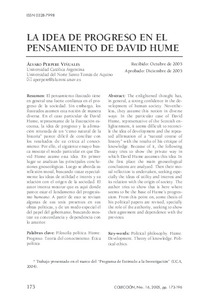Por favor, use este identificador para citar o enlazar este ítem:
https://repositorio.uca.edu.ar/handle/123456789/9873| Título: | La idea de progreso en el pensamiento de David Hume | Autor: | Perpere Viñuales, Álvaro | Palabras clave: | Hume, David, 1711-1776; PROGRESO; GNOSEOLOGIA; FILOSOFIA POLITICA; ETICA POLITICA | Fecha de publicación: | 2005 | Editorial: | Pontificia Universidad Católica Argentina. Facultad de Ciencias Sociales. Departamento de Ciencias Políticas y Relaciones Internacionales | Cita: | Perpere Viñuales, Á. La idea de progreso en el pensamiento de David Hume [en línea]. Colección. 2005, 16. Disponible en: https://repositorio.uca.edu.ar/handle/123456789/9873 | Resumen: | Resumen: El pensamiento ilustrado tiene
en general una fuerte confianza en el progreso
de la sociedad. Sin embargo, los
ilustrados asumen esta noción de manera
diversa. En el caso particular de David
Hume, representante de la ilustración escocesa,
la idea de progreso y la afirmación
reiterada de un “curso natural de la
historia” parece difícil de conciliar con
los resultados de su crítica al conocimiento.
Por ello, el siguiente ensayo busca
mostrar el modo particular en que David
Hume asume esta idea. En primer
lugar se analizan las principales conclusiones
gnoseológicas. Luego se aborda su
reflexión moral, buscando tratar especialmente
las ideas de utilidad e interés y su
relación con el origen de la sociedad. El
autor intenta mostrar que es aquí donde
parece estar el fundamento del progresismo
humeano. A partir de esto se revisan
algunas de sus tesis presentes en sus
obras políticas, y de un modo especial el
del papel del gobernante, buscando mostrar
su concordancia y dependencia con
lo anterior. Abstract: The enlightened thought has, in general, a strong confidence in the development of human society. Nevertheless, they assume this notion in diverse ways. In the particular case of David Hume, representative of the Scottish enlightenment, it seems difficult to reconcile the idea of development and the repeated affirmation of a “natural course of history” with the results of his critique of knowledge. Because of it, the following essay tries to show the private way in which David Hume assumes this idea. In the first place the main gnoseological conclusions are analyzed. Then their moral reflection is undertaken, seeking especially the ideas of utility and interest and its relation with the origin of society. The author tries to show that is here where seems to be the base of Hume’s progressism. From this point on, some thesis of his political papers are revised, specially the role of the authority, seeking to show their agreement and dependence with the previous. |
URI: | https://repositorio.uca.edu.ar/handle/123456789/9873 | ISSN: | 0328-7998 (impreso) 1850-003X (online) |
Disciplina: | CIENCIA POLITICA | Derechos: | Acceso abierto | Fuente: | Colección. 2005, 16 |
| Aparece en las colecciones: | COL - 2005 Año XI nro. 16 |
Ficheros en este ítem:
| Fichero | Descripción | Tamaño | Formato | |
|---|---|---|---|---|
| idea-progreso-pensamiento-david.pdf | 474,05 kB | Adobe PDF |  Visualizar/Abrir |
Visualizaciones de página(s)
618
comprobado en 09-feb-2026
Descarga(s)
2.735
comprobado en 09-feb-2026
Google ScholarTM
Ver en Google Scholar
Este ítem está sujeto a una Licencia Creative Commons

